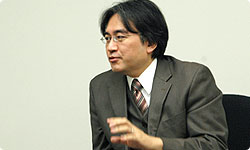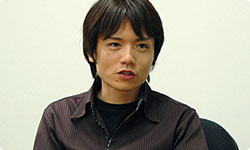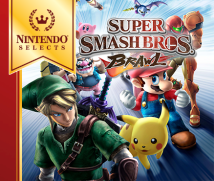2. For First-time Gamers
Putting it another way, I think games like Wii Sports and Wii Fit, games that anyone can enjoy, are a good thing for Smash Bros. Brawl. Without games like these, there would be those that would otherwise not come into contact with a form of entertainment like gaming.
Right.
Though not everyone who picks up a controller for the very first time because of games like Wii Sports or Wii Fit will play Smash Bros. Brawl, there will most certainly be those that do. And among them, I’m sure there will be those who will find Smash Bros. interesting too. Games like Wii Sports or Wii Fit will draw people in through their appeal to the senses, and this, in turn, will develop their interest in games like Smash Bros. Brawl. I think that is the true meaning of expanding the gaming population. Of course, I’m not trying to say that Smash Bros. isn’t meant for beginners and, in fact, development of the original Smash Bros. began with the idea of making a game that people unfamiliar to gaming could come to enjoy just as much as everyone else within the first ten minutes of play.
Right. That is the main concept behind the Smash Bros. series, and the feature is more well-defined in Smash Bros. Brawl.
Also, I think that fundamentally, we shouldn’t try and separate the casual gamers from the core gamers. After all, everyone starts off as a casual gamer. Some of these casual gamers will end up falling in love with gaming. Despite this fact though, I think that people too often treat them as entities that are inherently different.
Absolutely.
I think this is because we ignore the passage of time and tend to take a snapshot solely of the present when we talk about these things. But it’s different. People that love games and are really good at games were once, at some point in the past, casual gamers themselves. That’s why it’s so important to make sure that you continue to bring in new gamers. If you don’t, there will come a day when you don’t have any more customers.

I agree.
Now that I think of it, that’s something you started saying when you designed Kirby. You were able to make a game like Kirby in order to get people interested in gaming and that it would be a type of game you could recommend to first-time gamers.
Wow, that brings back some memories! (laughs)
I don’t think you’ve ever let go of that concept - not even once. Actually, this is one of the more unusual facts about this man we call Sakurai; even though he’s an extremely skilled gamer, he always goes to great lengths to develop games that first-time gamers can pick up without hesitation. Generally speaking, skilled gamers tend to make games for themselves. This being the case, how did your particular mindset come about?
Well, I think the first thing that I should clear up is that lately my gaming skill has mellowed down a bit.
Right.
And, this is something that I often told you back in the day, but before coming to HAL, I played a lot of different games and tried to look at games on the market from a variety of angles. What I felt at the time, just like you said earlier, is that games you could recommend to a first-time gamer didn’t exist. At the time, complexity was escalating and the only games available were ones that really challenged its players.
Every game was focused on solving something. Shooting games required you to evade hails of gunfire and fighting games kept growing more and more difficult.
Right. So it’s only natural that I had some doubts about games at the time.
Well, it may be natural in retrospect, but I think the fact that you have been saying that all along is pretty substantial.
Well, gaming for me is not about making games that I want to play.
Right.
Ultimately, gaming should be about the customers and I couldn’t figure out at the time why there were so few games made with the customers in mind. I thought it strange at the time and I feel the same way today.

You know, listening to what you said called to mind how we worked on Kirby and started the Smash Bros. series to make it much easier for first-time users to get into gaming, and that making games that everyone can play doesn’t mean making simple games. Working on games like this with you had a big impact in defining how I would come to view gaming. In other words, my thoughts on expanding the gaming population, targeting gamers age five to ninety-five or refusing to think of gamers in terms of age, sex or gaming experience...I think the roots of the ideals I espouse are tied to our experience together, and I feel they were inspired by you. Of course, a mantra of mine is that of the experiences I’ve had, there’s nothing that was put to waste. What I learned from you, however, is of especially great value.
Speaking of shared roots, we were both surprised in regards to the similarities between the direction of the Smash Bros. Brawl network and the Wi-Fi connection proposed by Nintendo.
That’s right. That was a surprise alright. Why don’t we talk about it next?
Let’s. (To be continued)
